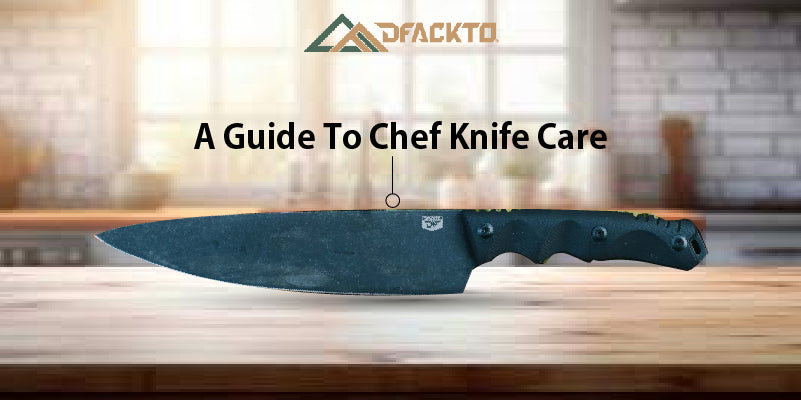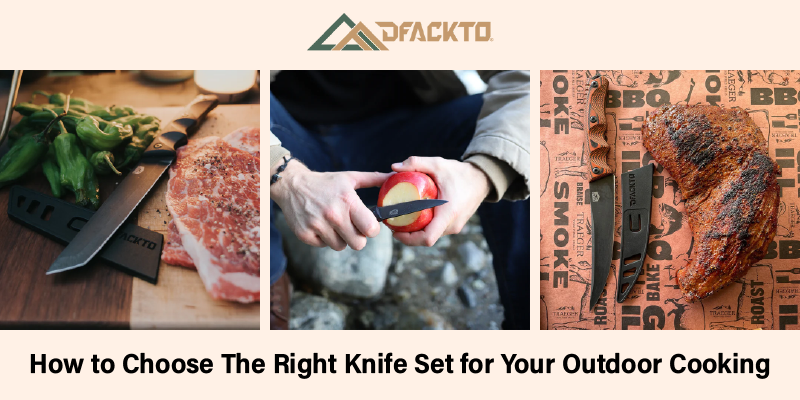A necessary tool highly esteemed in the culinary world, high-quality chef knives are famous for their adaptability and practicality.
Whether you've just bought the knife of your dreams or inherited a well-used one, it's important to know how to maintain your chef's knife. Doing so is necessary to keep them in shape.
Use warm, soapy water to carefully wash your knife, and then pat it dry with a soft cloth. All top-recommended chef knives have delicate and sharp blades and should not be cleaned with abrasives or strong detergents.
The best chef knife is always kept clean. Always rinse your knife after use to avoid food buildup. Use a gentle sponge and warm, soapy water for more stubborn messes. Do not put the blade or handle in the dishwasher, as strong detergents and clanging might damage the blades.
It is not a good idea to soak a knife in water, even if grime is stuck. If you let the knife stay wet or unclean for too long, the carbon blades will rust, and the handles will get water-damaged. Wipe or rinse the blade with warm water and soap, then dry it immediately. Most cooks use top-rated chef knives and maintain clean blades by constantly wiping them with a kitchen cloth while cooking.
Never let your professional chef knives air dry, as it can cause rust. Use a fresh, lint-free cloth to dry them right away. Consider investing in a knife block or a magnetic strip to keep them secure and reach them easily.
Also Read: Top 5 Features to Look While Buying the Best Chef Knife
A knife bag is essential for chefs who are serious about keeping their blades sharp. These bags are specifically designed with specialized compartments that allow quick access and secure storage, keeping knives safe while being transported.
Professional knives for chefs have handles made of natural materials, like wood or bone, that require care to prevent drying out. Danish oil, butcher block oil, mineral oil, wood furniture wax, or any other penetrating wood oil can restore the handle's luster and protect the wood from damage.
Handle materials can shrink and expand, causing rough edges or joints. You can use steel wool or lightly sand them to smooth them out.
The best knives for professional chefs need sharpening to prevent them from becoming dull. You need two tools for sharpening: a sharpening steel and a water stone. Honing reduces microscopic dents and chips; a water stone will fix any major damage (save a badly chipped knife).
Many knife users use improper cutting surfaces. Cutting through hard materials like glass, porcelain, or granite will dull even the best chef knife for professionals. These rough surfaces can dull or even break the blades. While chopping straight on granite may not seem like an issue, the surface may harm the blade by quickly dulling its edges.
Go for a hardwood (end grain) or plastic board. They prevent wobbling and clean easily in the dishwasher.
When you know how to use your chef knife correctly, you can keep it sharp while preventing damage. Never pry, twist, or open anything with it to avoid causing the blade to break or bend. Instead, use it as a single tool. Do not cut through bones or other hard, frozen objects, as doing so could chip the edge. Instead, stick to slicing and chopping. Avoid over-flexing near the handle by cutting steadily and using the blade's length. To keep your knife blades in excellent shape, always cut on a plastic or wooden cutting board and never drag them across hard surfaces.
Final Thoughts
It's important to learn how to properly care for your high-quality chef knives to get the most out of them and protect your investment. Doing so will keep them sharp and safe for many years.
Looking to buy a chef knife? Check out premium knife sets at Dfackto. Shop today!
Frequently Asked Questions
Yes! Hard detergents, water, and severe dishwasher temperatures can dull and deform knife blades and harm the handle.
Leaving knives in water is not recommended as it can ruin the blade and make it dangerous. It increases the risk of blade rust and usually degrades the handle.
Sharp blades are safer than dull ones. Sharp blades can cut, but they rarely inflict deep, serious wounds. Cutting requires more force than usual. If the knife slips, the increased pressure will make the injuries worse.
Oil kitchen knives to avoid rust and corrosion. Depending on the oil, this can condition the metal and sharpen the blade.
Most steel is non-porous, so sterilization is not necessary. However, you can sterilize it with 70% isopropyl (rubbing) alcohol if you wish.



